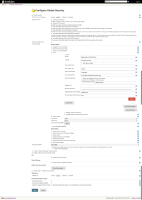-
Bug
-
Resolution: Not A Defect
-
Minor
-
None
-
Jenkins 2.60.1 on RedHat Enterprise Linux 5
Quite contrary to what is written on https://wiki.jenkins.io/display/JENKINS/Jenkins+SSH, X-SSH-Endpoint header is not provided on the top page when the response is 403.
$ curl -I http://localhost:8440/jenkins/ HTTP/1.1 403 Forbidden Date: Wed, 19 Jul 2017 13:43:33 GMT X-Content-Type-Options: nosniff Set-Cookie: JSESSIONID.32f49371=15lrqwbgqu5jvm4xkf7ulfomu;Path=/jenkins;HttpOnly Expires: Thu, 01 Jan 1970 00:00:00 GMT Content-Type: text/html;charset=UTF-8 X-Hudson: 1.395 X-Jenkins: 2.60.1 X-Jenkins-Session: 567160ff X-Hudson-CLI-Port: 37318 X-Jenkins-CLI-Port: 37318 X-Jenkins-CLI2-Port: 37318 X-You-Are-Authenticated-As: anonymous X-You-Are-In-Group-Disabled: JENKINS-39402: use -Dhudson.security.AccessDeniedException2.REPORT_GROUP_HEADERS=true or use /whoAmI to diagnose X-Required-Permission: hudson.model.Hudson.Read X-Permission-Implied-By: hudson.security.Permission.GenericRead X-Permission-Implied-By: hudson.model.Hudson.Administer Content-Length: 829 Server: Jetty(9.2.z-SNAPSHOT)
One needs to get response 200 (i.e. access login URL) to get the endpoint. Note that CLI ports ARE returned always, only SSH endpoint is missing.
$ curl -I http://localhost:8440/jenkins/login HTTP/1.1 200 OK Date: Wed, 19 Jul 2017 13:43:41 GMT X-Content-Type-Options: nosniff Set-Cookie: JSESSIONID.32f49371=6balu16gxdidrwpc4t258io;Path=/jenkins;HttpOnly Expires: 0 Cache-Control: no-cache,no-store,must-revalidate X-Hudson-Theme: default Content-Type: text/html;charset=UTF-8 X-Hudson: 1.395 X-Jenkins: 2.60.1 X-Jenkins-Session: 567160ff X-Hudson-CLI-Port: 37318 X-Jenkins-CLI-Port: 37318 X-Jenkins-CLI2-Port: 37318 X-Frame-Options: sameorigin X-Instance-Identity: MIIBIjANBgkqhkiG9w0BAQEFAAOCAQ8AMIIBCgKCAQEAlwNEtMd78Uf5V2p+hCgcHOazeDpoo9lKZL7YlqgzpuQeJvHfhMZ+fRCTCoIns/swiE5tG0WttqRL4z7tgA+xF8+KzKFuUtONhar+4kGDIhrJks+MuyePpEpzXplHtcB9OFUymfwTXrOBXExswjdGodqupyG9IBG1Xlx51oRHRXHEci3QgF1f/7+KfsZM3oCTOpyQxNasE5dki4nA33PvvAeZGHwxvdJ0nmLcbAVk8aSCzjuDbJZ+GnjJC+CsLR34AYWHNbxOo8rn9PCiIJid43UX/36HmYweWlUdRsnBfXtHL02/NV6OngWvWAowmFmVz9YzLj5+C4Q9QshZmvhbFwIDAQAB X-SSH-Endpoint: server:55999 Content-Length: 7304 Server: Jetty(9.2.z-SNAPSHOT)
- mentioned in
-
Page Loading...
